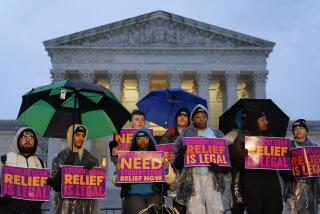The latest Obamacare rulings: A roundup of the damage reports

For a brief moment Tuesday, it looked as though the Affordable Care Act was in big trouble, for a three-judge panel of the federal appeals court for the District of Columbia had overturned federal insurance subsidies for insurance buyers in 36 states.
But the triumph of conservatives’ latest “not-so-veiled attempt to gut” the act (I am quoting from Judge Harry Edwards’ dissent from the 2-1 majority ruling in the case of Halbig v. Burwell) was short-lived. Within a few hours, three judges of the 4th Circuit Court of Appeals, sitting in Richmond, ruled the other way in King v. Burwell, upholding the insurance subsidies.
Most legal observers expect the Obama Administration to appeal the D.C. panel’s ruling to the full 11-member court, whose Democratic-appointed majority is considered likely to uphold the subsidies. Whether the issue makes it to the Supreme Court is uncertain: If the appeals courts both end up supporting the subsidies, the Supreme Court might let their opinions stand.
But the controversy provides another illustration of the lengths to which conservatives and Republican officeholders in certain states will go to deprive their citizens of the basic human right to healthcare.
The challenge to the ACA’s subsidies, on which the courts ruled Tuesday, is based on whether the law says that federal tax subsidies for premiums and other insurance costs can be provided for all buyers of individual insurance, or only buyers in the 14 states that set up their own state insurance exchanges rather than letting the federal government do it for them.
The law’s language is unclear in spots, but its drafters say their intention was that all buyers would be eligible for subsidies, assuming their incomes were low enough. In normal political circumstances, that would be enough for the courts to wave through what seems to be an obvious drafting glitch. Not these days.
The D.C. court’s ruling, if it became settled law, would deprive as many as 4.7 million Americans of the assistance that makes their insurance affordable.
A large proportion of these Americans live in the same mostly Southern and Republican-controlled states that have also refused to expand Medicaid to provide health coverage to the poorest of their poor. Residents of those same states also have, on average, the poorest health profiles and poorest access to health insurance in the country. Those are also the states where the increase in costs imposed on residents by the ruling would be the sharpest. (See the accompanying map for the details.)
Do you see a pattern here?
As for the merits of the legal argument, Judge Thomas Griffith, the author of the Halbig opinion, seemed to start with the presumption that the ACA needed to be hollowed out, and to work back from there to a legal rationale.
Griffith gave the game away by treating the effects of the Affordable Care Act exclusively as burdens for individuals to be avoid, rather than as benefits to obtain.
The choice confronting Americans under the law, he wrote, is whether to spend money for health insurance (at whatever subsidized cost) or pay a federal tax penalty for not having it. But he slipped a card out of the deck: Spending money for health insurance means you get health insurance. For millions of Americans in the pre-ACA era, this wasn’t an option. The ACA gives them that option.
So is it a cost or a benefit? The absurdity of the question is illustrated by the claim of one of the plaintiff/appellants, David Klemencic, a West Virginia flooring contractor whose annual income is $20,000.
Let’s set aside that Klemencic’s general understanding of the law, as published in Inc. magazine, is almost comically flawed. His position, as articulated by Judge Griffith, is that the ACA forces him to either “purchase health insurance at a subsidized cost of less than $21 per year or pay a somewhat greater tax penalty.”
Without the federal subsidy he contends is illegal, Klemencic’s insurance premium would be so expensive that he’d be entirely exempt from the ACA and therefore wouldn’t have to buy insurance at all.
In other words, Griffith wrote, the ACA “confronts Klemencic with a choice he’d rather avoid”: whether to obtain health coverage for less than $1.75 a month or pay a higher tax penalty for the privilege of going without any coverage at all. When Dickens’ Mr. Bumble declared that “the law is a ass,” he wasn’t talking about plaintiffs like Klemencic. But the latter certainly sounds like an ass, or at least like an unwitting tool of forces that have nothing like his interests at heart.
Judge Griffith’s analysis was based on a single clause in a single provision, viewed in a vacuum. The clause seems to make a distinction between state-created exchanges and those created by the federal government for states that refused to do so themselves, which would seem to reserve subsidies only for the former. This argument was rejected in the King case by the 4th Circuit, which recognized that it would make much of the rest of the ACA nonsensical, and thus clearly was a error or oversight; normally, in such cases, the language of stray provisions has to be read in the context of the whole law, those judges ruled.
Griffith himself acknowledging the context himself: The ACA’s goal was “to increase the number of Americans covered by health insurance and decrease the cost of health care,” he wrote, and that the law itself set forth “a complex network of interconnected policies.”
Griffith anointed his ruling with what looked and tasted like crocodile tears--”we reach this conclusion, frankly, with reluctance,” he wrote, observing that it will “likely have significant consequences both for the millions of individuals receiving tax credits...and for health insurance markets more broadly.” But he claimed to find in the ACA Congress’ intention to fatally undermine its own law by restricting tax subsidies only to purchases on state, not federally assisted, exchanges.
But a similar reluctance didn’t govern the thinking of the people who concocted the legal theory Griffith accepted. They’re Jonathan Adler, a law professor at Case Western Reserve law school, and Michael Cannon, director of health policy studies at the libertarian Cato Institute.
Cannon, for his part, has never made a secret of his hostility to the Affordable Care Act; among his objections is that it shifts the cost of coverage from working-class and poor enrollees to “taxpayers,” by which he can only mean wealthier taxpayers. Cannon couches this objection in the libertarian vocabulary of “freedom”--victory in the Halbig case, he has written, would “free” 57 million Americans and 250,000 businesses from the oppression of the insurance mandate and ACA taxes.
Readers might recall that in April I accused Cannon of writing “the lamest anti-Obamacare column of all.” In it he suggested, bizarrely, that the ACA actually gave people an incentive to drop their individual coverage. If you dropped your coverage and then came down with a horrid disease, he observed, you could always re-enroll. And if you needed to enroll in a hurry, without suffering through what might be a yearlong waiting period, you could do so by quickly getting married, moving to a new state, getting pregnant or misleading the government about your real income. Or you could seek help from “friends, family or the kindness of strangers.” (Yes, he proposed this as national healthcare policy.)
Cannon’s assessment of the consequences of Halbig are equally dubious. Just before the ruling came down, he wrote that it wouldn’t increase premiums at all--premiums would stay the same, he argued, but enrollees would simply have to pay their whole cost rather than sharing the cost with the government. To the argument made by health economists that millions of Americans would drop policies made economically ruinous, which would raise premiums for those who remained, Cannon responded blithely:
“If a lack of subsidies in federal Exchanges leads to adverse selection, Halbig is not the cause. The cause is Congress tying those subsidies to state-established Exchanges, and 36 states refusing to cooperate.”
Well, that’s one way of looking at it. It’s the same as saying that the problem with Halbig isn’t the cramped and illogical legal argument of Adler and Cannon, but the carelessness and stupidity of the judges who accepted it.
Excellent analysis of Halbig from Jonathan Cohn of The New Republic, Kevin Drum at Mother Jones, Kevin Outterson at the Incidental Economist, Rick Hasen at Slate, and Charles Gaba at ACASignups. (Not a complete list.)
Keep up to date with The Economy Hub by following @hiltzikm.






